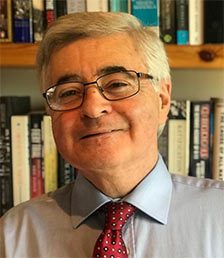Mr. Gerard Quinn
Special Rapporteur on the rights of persons with disabilities
 Mr. Gerard Quinn was appointed the UN Special Rapporteur on the rights of persons with disabilities by the Human Rights Council at its 45th session, in October 2020.
Mr. Gerard Quinn was appointed the UN Special Rapporteur on the rights of persons with disabilities by the Human Rights Council at its 45th session, in October 2020.
Mr. Quinn holds two research chairs at the Raoul Wallenberg Institute on Human Rights in the University of Lund (Sweden) and Leeds University (UK).
A graduate of Harvard Law School, the King's Inns (Dublin) and the National University of Ireland, he formerly held a chair at the National University of Ireland where he founded and directed the Centre on Disability Law & Policy.
In Ireland, he served as a member of the Commission on the Status of People with Disabilities (1992-1996) which was composed of a majority of persons with disabilities. This Commission produced an early blueprint for change in Ireland based on equality. He was Director of Research at the Government's Law Reform Commission (1997-1998). He was a member of the Irish Government Taskforce on the individualization of budgets and services (2017-2018). He served two terms on Irelands’ Human Rights Commission. At the invitation of the President of Ireland, he served on the Council of State (Ireland) from January 2012-2018.
Mr. Quinn was the lead ‘focal point’ for the global network of National Human Rights Institutions (NHRIs) during much of the negotiation of the UN Convention on the Rights of Persons with Disabilities and was head of delegation for Rehabilitation International during the UN Working Group (2004). He has served as First Vice-President of the European Committee on Social Rights (a human rights monitoring body on economic and social rights in the Council of Europe) where he helped develop its jurisprudence on the rights of persons with disabilities and older persons.
He has received three awards for his work on international disability Law - from Rehabilitation International (RI), the US International Council on Disability (USICD) and the European Association of Service Providers (EASPD). He served as a temporary civil servant in the European Commission (agent auxiliaire) in the mid-1990s and helped develop its policy on disability based on equality (1996). He served as a member of the Scientific Committee (research advisory board) of the EU Fundamental Rights Agency (2013-2018) with responsibility for disability and elder rights.
He has served in the past on several other advisory boards on disability issues including Human Rights Watch (NYC), Open Society Foundations (Washington DC), Interights (London) and the European Foundation Centre (Brussels).
His publications focus on international and EU disability law and many of them have been translated into Japanese, Chinese, Russian, French and Spanish. He has led and undertaken research for the Office of the UN High Commissioner for Human Rights (2002 Study on the ‘Current use and Future Potential of UN Human Rights treaties in the context of Disability) and more recently concluded a Study for the UN OHCHR on Achieving Independent Living - The Future of the EU Structural Funds (April 2012). He co-directed the EU Structural Funds Watch research programme and published a major report in the European Parliament in 2017 on current experience under the Funds. He co-directed research for the European Commission in 2010 on the implications of EU ratification of the UN disability treaty (published by the European Foundation Centre). His recent publications include a book on genetic discrimination law as well as a manual for National Human Rights Institutions on disability issues. He speaks regularly around on the world on disability issues and was recently (2017) the European keynote speaker at the Asia/Europe Meeting (ASEM, Beijing) on disability rights.
Mr. Quinn has held visiting professorships and research positions at Harvard Law School, the University of New South Wales (UNSW-Australia) the National Academy for Legal Studies and Research (NALSAR, Hyderabad) India, Deakin University (Australia), Fudan University (Shanghai), Wuhan University Law School (China) and Haifa University (Israel). He was made a Government of India fellow in 2015 (GIAN programme) where he taught a course on new advances in biotechnology and personhood.
He has published recently on the lessons to be learned from the drafting of the UN disability treaty for a possible UN treaty on the rights of older persons as well as on autonomy and legal capacity for older persons. His current research interests include theories of personhood and new technology, intersectionality between age and disability, extreme poverty and disability, and the protection of persons with disabilities during armed conflicts.